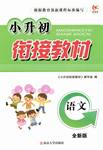题目内容
13.假定英语课上老师要求同桌之间交换修改作文,请你修改你同桌写的以下作文.文中共有10处语言错误,每句中最多有两处.每处错误仅涉及一个单词的增加、删除或修改.增加:在缺词处加一个漏字符号(^),并在其下面写出该加的词.
删除:把多余的词用斜线(\)划掉.
修改:在错的词下画一横线,并在该词下面写出修改后的词.
One day,we were eating an early dinner after it rained heavily outside.And then we received a special delivery.
We found poor dog sitting in front of our gate.My husband brought it into the house.It stayed calmly as we dried it with a towel.I named it was Pumpkin.We liked it very much and let it sleeping with us.
For the first time in my life,I have a dog of my own.Pumpkin's appearance helped me in some way.It taught me what this meant to be responsible of another life.It also made me overcome its fear of animals.
分析 本文讲述了我第一次养狗的经历.
在一个雨天,一只小狗来到我家门前,丈夫把它抱到屋里,在我们给它擦干毛发的时候,它一直很安静,我给它取名Pumpkin,它是我人生的第一条狗,它的出现让我有了责任感,同时克服了对于动物的恐惧.
解答 One day,we were eating an early dinner after it rained heavily outside.And then we received a special delivery.
We found∧poor dog sitting in front of our gate.My husband brought it into the house.It stayed calmly as we dried it with a towel.I named it was Pumpkin.We liked it very much and let it sleeping with us.
For the first time in my life,I have a dog of my own.Pumpkin's appearance helped me in some way.It taught me what this meant to be responsible of another life.It also made me overcome its fear of animals.
解析:
1.after改为when.考查连词.语境表示,我们正在吃晚饭,就在这时突然外面下大雨了.When"在…时,当…时",符合语境.故把after改为when.
2.在poor前加a.考查冠词.此处泛指一只可怜的狗.故在poor前加a.
3.calmly改为calm.考查表语.stay calm"保持平静",此句中stay为系动词,应用形容词作表语.故把calmly改为calm.
4.去掉was.考查宾语补足语.语境表示,我给它取名为Pumpkin.name sb.sth."给某人取名为…".故把was去掉.
5.sleeping改为sleep.考查非谓语动词.let sb.do sth."让某人做某事",let后接不带to的动词不定式作宾补.故把sleeping改为sleep.
6.have改为had.考查动词的时态.根据语境可知,此句应为一般过去时态.故把have改为had.
7.way改为ways.考查名词.Pumpkin's appearance helped me in some way表示Pumpkin的出现在某些方面帮助了我,所以应用名词ways.
8.this改为it.考查代词.在what引导的宾语从句中,应用it作形式主语,代替真正的主语动词不定式.故把this改为it.
9.of改为for.考查介词.be responsible for"对…负责"是固定搭配.故把of改为for.
10 its改为my.考查代词一致.语境表示,它也使我克服了对动物的恐惧.故把its改为my.
点评 考查语法改错.when 用作连词.
1.用作从属连词,意为"当…的时候",引导时间状语从句.例如:
They learned a lot from the peasants when they stayed in the village.
他们住在那个村子时,从农民那里学到了许多东西.
2.用作从属连词,意为"一…就…",引导时间状语从句.例如:
We will stand up when the teacher comes into the classroom.老师一进教室我们就起立.
3.用作从属连词,意为"还没/刚刚…就",引导时间状语从句.例如:
I had hardly opened the door when he came in.我刚一开门,他就进来了.
4.用作从属连词,意为"倘若,如果",表示条件.例如:
He will be likely to recover when he is operated on.如果动手术,他有可能康复.
5.用作从属连词,意为"既然,尽管",表示让步.例如:
Why use metal when you can use plastic?既然能用塑料,为什么用金属呢?
6.用作并列连词,意为"在那时,届时",表示时间.这时主句中可以用过去进行时,过去完成时或"was/were about to do sth."结构.例如:
Last night I was about to go to bed when the phone rang.昨天晚上我正要上床睡觉时,电话铃响了.
7.用作并列连词,意为"虽然、然而、可是",表示转折.例如:
He usually walks to work when he might take a bus.虽然他可以坐公共汽车上班,但他却常常步行上班.
8.用作并列连词,意为"而、却",表示对比.例如:
How can he say that everything is fine when it's obvious that it is not?他怎能说一切都好呢?情况显然不是那样.

 学而优衔接教材南京大学出版社系列答案
学而优衔接教材南京大学出版社系列答案| A. | turned to | B. | added to | C. | kept to | D. | referred to |
| A. | whispered | B. | shouted | C. | explained | D. | replied |